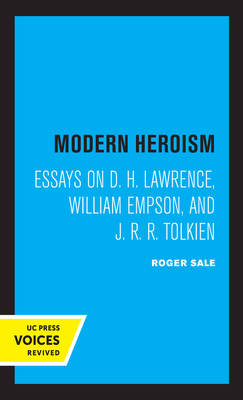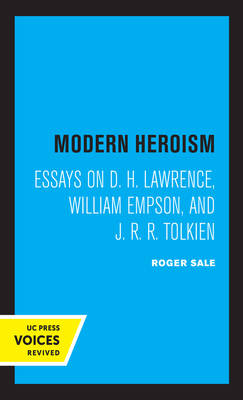
- Retrait gratuit dans votre magasin Club
- 7.000.000 titres dans notre catalogue
- Payer en toute sécurité
- Toujours un magasin près de chez vous
- Retrait gratuit dans votre magasin Club
- 7.000.0000 titres dans notre catalogue
- Payer en toute sécurité
- Toujours un magasin près de chez vous
Modern Heroism
Essays on D. H. Lawrence, William Empson, and J. R. R. Tolkien
Roger Sale
Livre relié | Anglais
161,45 €
+ 322 points
Format
Description
In these three studies, hinging on an unusual theme, Roger Sale examines three very different writers: an impassioned novelist, a wry and witty literary critic, and a donnish teller of apparently old-fashioned romances that have achieved a cult following today. Many people assume that heroism is dead because the heroic styles of past ages no longer exist. Roger Sale contends that this assumption is accompanied by other beliefs that are part of what he calls the Myth of Lost Unity (a variation on the myth of the Golden Age): a sense that the world was once "whole" but in recent centuries has gradually disintegrated; a feeling that the human condition is now lost or alienated or drifting; and a conviction that the proper response to life is resignation, cynicism, or despair. Sale reminds us that Lawrence, Empson, and Tolkien all came to believe in the major features of the Myth of Lost Unity. Each, however, replied to what seemed his--and our fate--and defied the implications of the myth, achieving a community as a badge of that defiance. Sale's exploration of their separate merits reveals how their heroism made them alike. The strength of Modern Heroism lies in the formidable critical powers Sale exercises in his three variations on its theme.
This title is part of UC Press's Voices Revived program, which commemorates University of California Press's mission to seek out and cultivate the brightest minds and give them voice, reach, and impact. Drawing on a backlist dating to 1893, Voices Revived makes high-quality, peer-reviewed scholarship accessible once again using print-on-demand technology. This title was originally published in 1973.
This title is part of UC Press's Voices Revived program, which commemorates University of California Press's mission to seek out and cultivate the brightest minds and give them voice, reach, and impact. Drawing on a backlist dating to 1893, Voices Revived makes high-quality, peer-reviewed scholarship accessible once again using print-on-demand technology. This title was originally published in 1973.
Spécifications
Parties prenantes
- Auteur(s) :
- Editeur:
Contenu
- Nombre de pages :
- 278
- Langue:
- Anglais
Caractéristiques
- EAN:
- 9780520356580
- Date de parution :
- 25-06-21
- Format:
- Livre relié
- Format numérique:
- Genaaid
- Dimensions :
- 140 mm x 216 mm
- Poids :
- 467 g

Les avis
Nous publions uniquement les avis qui respectent les conditions requises. Consultez nos conditions pour les avis.






